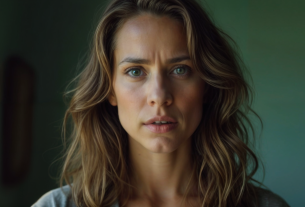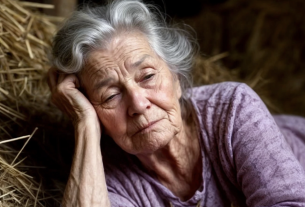Thursday. Early December. The rain poured down in sheets, as if the heavens were weeping alongside the earth.
Igor Sokolov was forty-two. He lived quietly, almost invisibly—alone, with his ten-year-old daughter Tamara. In their two-room apartment, laughter hadn’t been heard for a long time. Only footsteps, the ticking of the clock, and memories of Larisa—his wife, who had passed away two years ago, taken swiftly by breast cancer, before the pain could even take shape.
Life had shrunk to a cycle: work, cooking, homework, work again. Without extra words, without extra feelings. It was easier that way. Safer.
But that very evening, everything changed.
Someone knocked.
At the door stood a woman. Soaked, freezing, with three children behind her. Her name was Katya. Her husband had died six months earlier in a construction accident. Her relatives had turned away from her. The car they had been drifting in had broken down nearby. And now they simply… didn’t know where to go.
Igor didn’t ask questions. Didn’t think. He just said:
— You’ll stay with us. At least for tonight.
He didn’t understand why he said it. Six people in two rooms—that was absurd. But in her eyes, he saw the same thing he saw in his own—loneliness. And something else. Hope.
Tamara gave up her bed to the eldest girl. The rest settled on the floor. And for the first time in many years, the house became noisy. Alive. Real.
At first, there was chaos: spilled milk, screams from the bathroom, piles of laundry. But day by day, a new rhythm began to emerge from that chaos. Katya helped around the house, cooked soups, befriended Tamara with biology. The children called Igor “uncle” and built real forts from pillows. And he taught them how to fix things, plane wood, chop firewood. They were learning to be a family—slowly, cautiously, but sincerely.
Igor hadn’t expected this. He hadn’t thought he could feel again. That something still lived inside him. That salvation worked both ways.
People in the village noticed the change. They said: “Saint.” He just smiled:
— They saved me too.
One spring day, Katya found an old photo in a drawer—Igor and Larisa on their wedding day. She looked at it for a long time. Then handed it back to him. Tears sparkled in her eyes.
— She was very beautiful.
— Yes, — he nodded. — And everything she touched became home.
Katya gently placed her palm on his hand:
— And now?
They barely spoke that night. But in the silence between them, something changed—without drama, without promises. Just a feeling that each had found their place.
And soon April came. Along with it—job loss. Twelve years at the same place, and now—downsizing. Igor didn’t tell Katya for a long time. He didn’t want to burden her. But she found out anyway.
— Let me help, — she said simply.
Katya took a part-time job at a bakery. Igor began taking repair orders. The older children joined in: selling greens from the garden at the market. It was no longer a question of “who saved whom.” It became about “we.”
Tamara brought home an essay titled “My Miracle.” In it, she wrote:
“We were two. Now there are six. We didn’t look for them. They found us. Dad says he saved them. I think they saved him. Maybe that’s what love is—accepting each other, even when it’s hard. Now we are one.”
Igor read silently. Tears streamed down his cheeks. He understood: what started as an impulse had become a real miracle.
A wooden sign appeared on the door: “Welcome Home.”
Simple words. Great meaning. Sometimes the most important meetings happen when you’re least ready.
Katya was no longer a guest. She became a support. No labels, no obligations. She simply was there. When needed.
When the children were sick—they took turns watching over them. When the refrigerator broke—Katya found a solution. Slowly, cautiously, but confidently, they became family to each other.
That summer, at a noisy neighborhood party where half the village gathered, Igor stood by the grill, and the children splashed under the spray from a hose.
— Are you okay? — Katya asked, approaching with a towel.
He looked around the yard: paper plates, laughter, scraped knees, trusting children’s eyes—and smiled:
— I think I’ve become the best version of myself in the last ten years.
— Me too, — she whispered, leaning on his shoulder.
Late at night, when everyone was asleep, Igor stepped out onto the porch. He thought of Larisa. He missed her. But the pain no longer pressed—it had softened. Now he knew: he hadn’t forgotten her. He was simply living. Just as she would have wanted.
And the person who stood at the door in the rain asking for help…
It was no accident.
Not a burden.
It was mercy, disguised as need.
Love—disguised as chaos.
Healing—disguised as inconvenience.
And in that noise, in those embraces, in every breakfast and bedtime story—Igor found not a second chance.
He found a miracle worth waiting a lifetime for.



